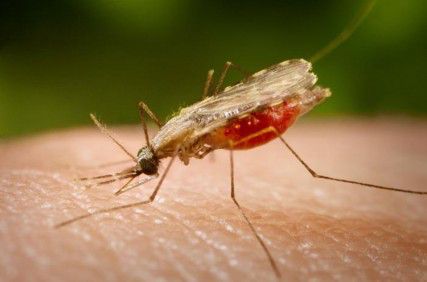
It’s kind of hard to believe that scientists study the mating hormones of mosquitoes, but a new discovery in the field could lead to the potential prevention of the spread of malaria.
Malaria is an infection spread by mosquitoes in the genus Anopheles. It causes flu-like symptoms and, if left untreated, can be fatal. Malaria is fairly uncommon in the U.S. with only about 1,500 cases diagnosed per year, according to the Centers for Disease Control and Prevention. However, worldwide, malaria affects nearly half the world’s population and has become a leading cause of death in Africa, where 91 percent of malaria-linked deaths occur.
The implications of this study, therefore, will impact people beyond U.S. borders — it will ultimately benefit all of humanity.
The study results
Researchers from the Harvard School of Public Health and the University of Perugia in Italy have discovered a male sex hormone that affects female egg production in Anopheles gambiae, a type of mosquito responsible for transmitting malaria.
Dr. Adam South, a postdoctoral research fellow in lead researcher Flaminia Catteruccia’s laboratory at Harvard, said researchers are aiming to learn about mosquito biology in order to control the output of the insects.
“We know that the most important strategy in controlling malaria, rather than really curing it, is to target the mosquito vector,” he said. “We think this is going to be an extremely effective way to try to combat mortality and sickness as a result of malaria.”
Published online in PLOS Biology on Oct. 29, the study identified the pertinent male sex hormone as 20-hydroxyecdysone, or “20E.”
Female mosquitoes, on the other hand, possess a protein called MISO, or Mating-Induced Stimulator of Oogenesis, where oogenesis refers to the production of eggs.
During sex, the 20E male hormone interacts with the female MISO protein in the female reproductive tract. 20E works as a signal — the hormone and protein interaction boosts the accumulation of a type of molecule called lipids in the ovaries. This leads to increased eggs production and therefore a higher procreation rate.
This study marks the first time scientists have been able to show that a male hormone directly interacts with a female protein to alter a female’s reproduction ability in any insect species.
It sounds like we’re being a bit intrusive, but it’s all in the name of science!
Malaria prevention
Though relatively uncommon in the U.S., malaria is a leading cause of death in many tropical and subtropical regions.
According to the World Health Organization, malaria was the cause of 660,000 deaths and 219 million clinical episodes in 2010 alone. About 86 percent of those deaths occurred in children, and WHO calculated that a child dies every minute from malaria in Africa.
According to the Centers for Disease Control and Prevention, more than 3.3 billion people currently live at risk of malaria transmission — nearly half the world’s population.
Malaria is characterized by high fever, chills and other flu-like symptoms. While often treatable in wealthier countries such as the U.S., malaria is deadly for those that do not have proper or affordable treatment available to them. The infection can eventually lead to kidney failure, seizures, confusion, coma and, in the worst cases, death.
Mosquitoes carrying the malaria parasite are the most common source of malaria being transmitted. The mosquitoes are excellent vectors for the infection because they reproduce rapidly and feed primarily on human blood.
When a female mosquito bites an infected human, she will become infected by the parasite. About a week later, when she bites another human, she will inject the parasite into the victim’s blood along with her saliva. Symptoms can be felt as quickly as within seven days. In other cases, however, an infected person may not notice symptoms for up to an entire year.
Pregnant women can also transmit the infection to their children prior to birth. These women are at an even greater risk for malaria due to changes in their immune systems and the development of a new organ, the placenta, which provides more places for the malaria parasites to bind.
South said these are just several reasons why understanding the genetics of the male sex hormone is pivotal to the prevention of malaria.
A new approach
South also said past research has tried to sterilize male mosquitoes using radiation. Unfortunately, this attempt proved unsuccessful — the radiation weakened the male mosquitoes and made them less competitive than fertile males. However, if the males could be genetically sterilized, South said this should not affect their competitiveness. If this is possible, females will mate with sterile males, producing fewer eggs that are not ever fertilized.
Still, South said he does not expect to totally eradicate the mosquito population.
“I don’t know if extermination is going to be possible,” he said, “but if you can reduce population levels even by 30 percent, it’ll have a pretty substantial impact.”
Jonathan Reyes, a School of Management junior, said extermination, even if possible, may have negative consequences.
“I feel like they have the basis for their study, but at the same time I don’t know if killing mosquitoes would be a good thing,” Reyes said. He suggested conducting further research in a small sample size before applying it to larger populations. “I think it’s for a good cause for [eradicating] malaria, but they would have to do it in a test group — like a specific location before they do it on the mass population.”
Unlike Reyes, however, College of Arts and Sciences freshman, Melissa Arjona, said this new approach could be successful.
“I think it’s important that it’s taking a different approach of treating the source of the problem and not going directly to the people and trying to cure them,” she said. However, she brought up some potential barriers surrounding further research.
“I think it would be a yes or no…based on how effective it’s going to be and based on the cost of doing this,” she said. “Or they could research other ways that would maybe be more beneficial and more efficient.”
Methods and approach
To study the MISO-20E interaction between male and female mosquito populations, the researchers used a method called RNA interference. South explained that the researchers found the gene they wanted to study — in this case, the one coding for MISO production — and synthesized a homologous strand of double-stranded RNA. The RNA was then injected into the mosquito body, where it stopped the translation of DNA to RNA for that particular gene, efficiently creating a “knock-down” of MISO in the females.
MISO was first found in females in 2008, but South said this is the first time 20E has ever been identified by researchers.
“I think we have very strong evidence that it is definitely the activator of it,” he said. “Whether or not there are some other important factors there, it’s definitely possible. But we know that it’s an extremely important activator and it serves an absolutely crucial role.”
Melody Eaton, a freshman in CAS, said she thinks this approach, which is different from anything she has ever heard of before, has could have far-reaching implications for health worldwide.
“I think it’s a very proactive approach,” Eaton said. “I’ve never heard of taking the mosquitoes and trying to alter them like that. I don’t know what the effects would be for something like that — whether there would be negative effects on other organisms. But it could be worth a shot.”
Like Eaton, Bryan Chambers, an SMG freshman, said he thinks the study is worth further exploration.
“I would say if they have the technology to do it, I don’t see any downside,” Chambers said. “I don’t see any negative effects or animal abuse. I don’t know what the arguments against it would be.”
Reyes, on the other hand, said he is still cautious of potential repercussions of research and said he questioned the morality of it.
“I think it is important, but at the same time what I’m thinking is about ethics,” Reyes said. “You’re basically manipulating what the world is supposed to be in a way that only suits our species. It begs the question of, ‘How far are you taking this?’”



























































































































